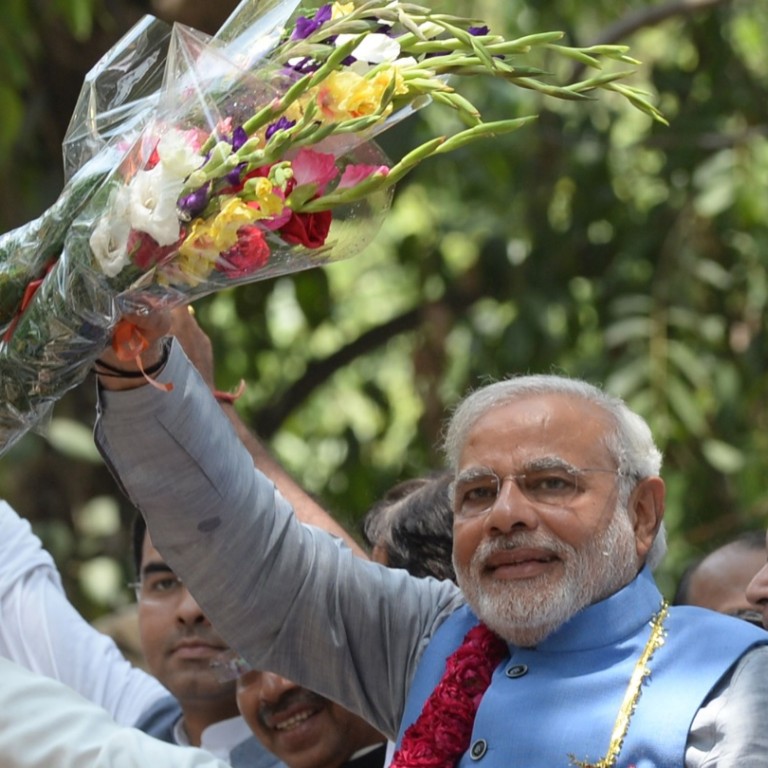
Modi and China: Old friends, new challenges
Incoming Indian leader forged bond with Beijing while chief of Gujarat state. Now the challenge is engaging him in his new role
As Narendra Modi sweeps into power, China will be counting the potential pay-off from a personal relationship, but his new status may also require a different strategy to engage an old friend.
Over the years, China and Modi have invested heavily in each other and forged a bond that could have far-reaching ramifications not only for Sino-Indian relations, but also for the US "Asia pivot" strategy at a time when territorial disputes in the South China Sea are taking a violent turn.
The hope generated by that bond was reflected in the way Chinese state media chose to downplay Modi's outburst about China's "expansionist mindset" in a recent election rally as necessary poll-time bluster.
China will need a very different strategy and to cut [Modi] a lot more slack
"Despite Modi's election rhetoric as a leading Hindu nationalist, Chinese diplomats expect him and his Bharatiya Janata Party - known for its tough stance on China - to change course," said Jack Linchuan Qiu, an associate professor at Hong Kong's Chinese University.
Long before Modi fashioned himself as a national leader, Beijing's talent scouts zeroed in on him when he began to reach out to China for investment in the western Indian state of Gujarat, of which Modi was chief minister.
The initial attraction was his pro-business approach and a no-nonsense administrative style that makes the state a rare investor-friendly island in a sea of bureaucratic sloth. But Beijing was also acutely aware that, as a rising star in India's then main opposition party, Modi brought more to the table than an investor's paradise, and began to cultivate him.
Modi has visited China four times. In 2011, he made a particularly high-profile five-day trip in which he was accorded a welcome generally reserved for heads of state. For his part, Modi carried red visiting cards printed in Chinese.
Beijing also heeded his request and freed most of 19 Gujaratis who had been arrested in Shenzhen on charges of diamond smuggling, boosting Modi's image at home.
Most important for Modi, China has burnished his foreign policy credentials, helping him stake a claim to national leadership. It did so at a time when the West would have nothing to do with him because of his alleged role in a 2002 pogrom against Muslims in Gujarat, in which more than 1,000 people were killed.
The United States denied Modi a visa in 2005 under the International Religious Freedom Act. That visa bar is still in place.
The US has been scrambling to make up of late, but the ice is far from broken.
This February, when it began to dawn on Washington that a Modi government was a real possibility and it couldn't continue to pretend he doesn't exist, then ambassador Nancy Powell met him for an hour. It was described by Indian media as a "frosty" exchange.
"The visa issue will surely play on Modi. Given his mandate, he could take bold measures vis-à-vis China but he's also an agile politician. If the US offers him enough opportunities, he could tilt either way," said Professor Srikanth Kondapalli of the Centre for East Asian Studies at Delhi's Jawaharlal Nehru University.
"As chief minister of a state, his priorities were different. This is a whole new ball game. China will need a very different strategy and to cut him a lot more slack to engage him if it seeks a big-bang boost to Sino-Indian relations."
Modi is also known to have an eastern bias, with Asian nationalism forming the core of his world view. Apart from China, that also draws him closer to Japan and Singapore, with whose leaders he has struck up a similar rapport.
Japan, in particular, has shown itself to be an important ally for the investments it brings and its readiness to transfer technology. Japanese investment in India between 2000 and 2014 stands at nearly US$16 billion, while China's is US$396 million.
Modi's unimpeachable conservative background and open admiration for China has in the past raised hopes of him becoming a sort of Indian Richard Nixon.
But as Kondapalli pointed out: "The US didn't have a disputed border or sovereignty issues with China."

